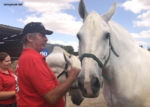In the world of equestrianism and horse breeding, the term Cheval DE Base holds significant importance. It refers to foundational principles and practices that govern the training and care of horses, particularly in the context of developing their abilities and optimizing their performance. Understanding these principles is essential for horse owners, trainers, and enthusiasts looking to enhance their knowledge and skills in handling horses.
What is Cheval DE Base and Its Historical Significance?
Cheval DE Base can be translated to “basic horse” or “foundation horse,” and it encapsulates the fundamental principles that underlie horse training and management. The historical significance of Cheval DE Base dates back to ancient civilizations where horses were domesticated for various purposes, including transportation, agriculture, and warfare. The practices surrounding horse management have evolved significantly over the centuries, shaping the modern understanding of horse care and training.
The concept emphasizes the importance of establishing a solid foundation for horses before they are trained for specific disciplines. This foundational training often involves teaching horses essential skills such as leading, grooming, and desensitization to various stimuli. Such practices are crucial in building trust and ensuring the horse’s mental and physical well-being. Historically, horses that received proper foundational training were more successful in their roles, leading to better performance in both work and sport.
Today, the principles of Cheval DE Base are recognized across various equestrian disciplines, from dressage to show jumping. They serve as guiding tenets for trainers and riders, ensuring that horses are prepared for the demands of their specific tasks. By understanding the historical context of Cheval DE Base, individuals involved in equestrian activities can appreciate the depth and evolution of horse training practices.
How is Cheval DE Base Applied in Horse Training?
The application of Cheval DE Base in horse training involves a structured approach that focuses on developing the horse’s basic skills and behaviors. This foundational training is critical for ensuring that horses are well-adjusted and capable of performing more advanced tasks later in their training. A key aspect of this application is understanding the horse’s natural instincts and behavior patterns, allowing trainers to create a supportive and effective learning environment.
The initial stages of training under the Cheval DE Base philosophy often include groundwork exercises that help establish respect and communication between the horse and handler. This groundwork lays the foundation for more advanced riding skills and fosters a strong bond built on trust. Trainers utilize techniques such as lunging, long-lining, and desensitization to prepare horses mentally and physically for ridden work.
Additionally, Cheval DE Base emphasizes the importance of positive reinforcement in training. Horses are encouraged to learn through reward-based systems, which can significantly enhance their willingness to participate in training sessions. This positive approach not only improves the horse’s responsiveness but also contributes to a more enjoyable and productive training experience for both horse and rider. Understanding and implementing the principles of Cheval DE Base is essential for anyone involved in horse training, as it sets the stage for future success.
What are the Key Principles of Cheval DE Base in Equestrian Practices?
The key principles of Cheval DE Base are foundational elements that guide trainers and riders in their interactions with horses. These principles encompass various aspects of horse care and training, emphasizing the need for a holistic approach that considers the horse’s physical and emotional needs. One fundamental principle is the concept of understanding horse behavior, which allows trainers to communicate effectively and address any issues that may arise during training.
Another important principle of Cheval DE Base is the significance of consistent and patient training. Horses thrive on routine and structure, and having a consistent training schedule can greatly enhance their learning process. This principle encourages trainers to be patient and understanding, recognizing that each horse learns at its own pace. Consistency also helps in building confidence and reducing anxiety in horses, creating a more positive training environment.
Moreover, the physical aspects of horse management are integral to Cheval DE Base. Proper nutrition, regular veterinary care, and appropriate exercise are crucial for maintaining the horse’s health and performance capabilities. This principle highlights the interconnection between a horse’s physical condition and its ability to learn and perform. By adhering to these key principles, individuals involved in equestrian practices can ensure that their horses are well-prepared for training and competitions.
How Does Cheval DE Base Influence Horse Breeding Practices?
Cheval DE Base plays a significant role in horse breeding practices, particularly in selecting breeding stock that exhibits desirable traits and behaviors. Breeders who adhere to the principles of Cheval DE Base focus on creating horses that not only possess strong physical characteristics but also have the temperament and trainability necessary for various equestrian disciplines. This approach recognizes that a horse’s foundational skills and temperament are just as important as its conformation and lineage.
Incorporating the philosophy of Cheval DE Base in breeding practices encourages breeders to prioritize soundness and suitability for intended purposes. For instance, a horse bred for dressage will ideally possess a calm demeanor, good movement, and an eagerness to learn. Understanding the traits associated with successful performance in specific disciplines allows breeders to make informed decisions when selecting stallions and mares.
Additionally, the concept of Cheval DE Base emphasizes the importance of early handling and socialization for foals. Properly socialized foals are more likely to develop into well-adjusted horses that are easier to train and handle. Breeders who implement early training practices aligned with Cheval DE Base are likely to produce horses that have a positive disposition and are capable of thriving in various equestrian environments.
What Role Does Cheval DE Base Play in Equine Therapy?
The principles of Cheval DE Base extend beyond traditional horse training and breeding, finding applications in equine therapy. Equine-assisted therapy programs often utilize horses that are well-trained under the Cheval DE Base philosophy to facilitate healing and personal growth in individuals with physical, emotional, or psychological challenges. Horses that are calm, responsive, and well-adjusted are essential for creating a safe and effective therapeutic environment.
In equine therapy, practitioners rely on the foundational skills established through Cheval DE Base to engage participants in meaningful interactions with horses. These interactions can promote emotional healing, improve communication skills, and foster a sense of responsibility. The principles of Cheval DE Base help ensure that therapy horses are well-prepared to handle various situations and individuals, which is critical for successful therapeutic outcomes.
Moreover, the calm demeanor and socialization of horses trained under the Cheval DE Base philosophy make them particularly suited for therapeutic work. Such horses can adapt to the diverse needs of clients, providing a comforting presence that can facilitate emotional connections and promote healing. By incorporating the principles of Cheval DE Base, equine therapy programs can enhance their effectiveness and support the overall well-being of participants.
How is Cheval DE Base Relevant in Competitive Riding?
In competitive riding, Cheval DE Base serves as a foundational framework that underpins the training and performance of competition horses. Riders and trainers who adhere to these principles are better equipped to prepare their horses for the demands of competition. The concept emphasizes the importance of building a strong partnership between horse and rider, which is crucial for success in various equestrian events.
Successful competitive riding begins with a solid foundation established through Cheval DE Base. This includes teaching the horse essential skills such as balance, responsiveness to cues, and confidence in different environments. Riders who prioritize these foundational skills in their training are more likely to see positive results during competitions, as their horses will be better prepared to handle the stresses and challenges of competitive environments.
Additionally, the principles of Cheval DE Base encourage riders to focus on the horse’s physical condition and overall health, which is vital for optimal performance. Proper conditioning, nutrition, and mental well-being are critical components that influence a horse’s ability to perform at high levels. By integrating the philosophies of Cheval DE Base into their training routines, riders can enhance their horses’ performance and achieve greater success in competitive settings.
What Challenges are Associated with Implementing Cheval DE Base Principles?
Implementing Cheval DE Base principles can present several challenges for horse owners and trainers. One significant challenge is the time commitment required to establish a solid foundation for the horse. Many individuals may be eager to progress to advanced training techniques without dedicating sufficient time to the groundwork essential for long-term success. Rushing through the foundational stages can lead to issues down the line, including behavioral problems and reduced performance capabilities.
Additionally, consistency in training is vital for the successful application of Cheval DE Base principles, but achieving consistency can be challenging. Factors such as changes in the trainer’s schedule, varying weather conditions, and the horse’s physical condition can all impact the training process. Maintaining a structured training regimen is crucial, but external influences can create obstacles that hinder progress.
Furthermore, the understanding of Cheval DE Base principles may vary among trainers and horse owners, leading to inconsistent applications of these concepts. Education and awareness are essential for ensuring that individuals involved in horse training fully grasp the significance of foundational principles. Overcoming these challenges requires a commitment to ongoing education and a willingness to adapt training methods to align with the core philosophies of Cheval DE Base.
Conclusion
The concept of Cheval DE Base serves as a cornerstone in the world of equestrianism, influencing training practices, breeding, competitive riding, and equine therapy. Understanding and implementing these foundational principles is essential for anyone involved in the care and management of horses.
By prioritizing the holistic well-being of the horse and emphasizing the importance of trust and communication, individuals can ensure that their equestrian endeavors are successful and fulfilling. As the landscape of equestrian practices continues to evolve, the principles of Cheval DE Base will remain a vital component, guiding horse owners and trainers towards a deeper understanding of their equine partners and the art of horsemanship.

